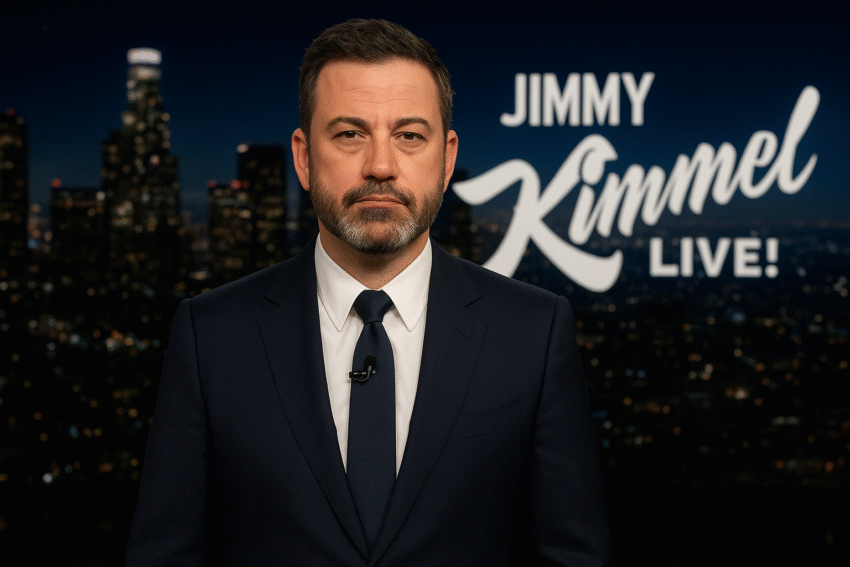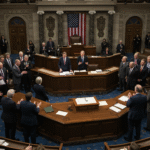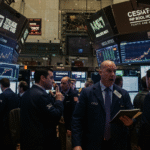Jimmy Kimmel: A Bold Stand for Free Speech
Historical Context and Comedic Style
Jimmy Kimmel, a prominent figure in American late-night television, has long been a conduit for cultural commentary through comedy. With his nightly talk show, “Jimmy Kimmel Live!”, Kimmel has carved out a niche that blends humor with critical discussions on political and social issues. Emerging in the spotlight in the early 2000s, Kimmel established himself with a unique blend of satire and genuine concern for societal norms, showcasing his ability to engage audiences while reflecting their perspectives, often employing sharp wit and a relatable demeanor.
His comedic style, characterized by spontaneous interactions, celebrity interviews, and poignantly crafted skits, set the stage for Kimmel to address contemporary issues. As times changed, Kimmel transitioned from mere entertainment to a voice of advocacy, particularly concerning free speech—a pillar of American democracy.
The Role of Late-Night Comedy in Political Discourse
In recent years, late-night shows have evolved beyond traditional entertainment, becoming a platform for political speech and activism. Kimmel is particularly instrumental in this shift, embracing the role of a modern-day commentator who isn’t afraid to tackle contentious topics. His ability to question authority, challenge narratives, and dissect political absurdities has resonated with audiences seeking clarity in a crowded media landscape.
The evolution of Kimmel’s content reflects broader societal challenges, where late-night comedy is no longer just about punchlines but about creating spaces where controversial subjects can be discussed. The comedienne’s use of humor as a mechanism to reflect societal grievances has reinforced its value as a tool for fostering dialogue and questioning powerful entities.
Navigating Censorship and Boundaries
Censorship has emerged as a prevailing concern in contemporary media, with several public figures and comedians facing pushback for their statements. Kimmel’s reemergence as a leading voice for free speech comes in the context of navigating these complex boundaries. He has repeatedly highlighted the challenges of speaking one’s mind, especially in an era rife with polarization and surveillance.
Kimmel’s response to these challenges is both personal and professional. He has often candidly discussed how fear of reprisal influences creators and comedians alike, stifling creativity and honesty. His willingness to address these issues openly serves as a rallying cry for the importance of maintaining open discourse, promoting the notion that silence in the face of censorship is unacceptable.
Illustrative Moments of Defiance
Throughout his career, Kimmel has not shied away from addressing controversial subjects head-on, exemplifying his commitment to free speech. A notable instance was during the COVID-19 pandemic, where he leveraged humor to address misinformation and political missteps. His viral skits and monologues often dismantled misconceptions, urging viewers to question readily accepted narratives.
Moreover, Kimmel’s fearless critique of both political parties highlights his commitment to truth over allegiance. By challenging figures such as the former president, Kimmel has demonstrated that free speech should not be contingent upon political affiliation. This commitment equips the public with essential insights while encouraging critical thinking and skepticism.
Supporting the Arts and Creators
Kimmel’s influence extends beyond his talk show. He has become an advocate for artists and creators facing restrictions on their expression. By collaborating with various organizations dedicated to fighting censorship and supporting artistic freedom, Kimmel champions the arts as an essential component of free speech.
His advocacy includes highlighting legislation that threatens creative expression and calling attention to individuals and communities whose voices have been marginalized. By standing up for those who often go unheard, Kimmel reinforces the importance of a diverse cultural landscape where every voice matters.
Engaging the Audience Through Social Media
In an age dominated by social media, Kimmel has embraced these platforms to extend his reach and engage in conversations about free speech. His witty and sometimes provocative tweets and posts connect with a broader audience, providing insights that extend beyond the bounds of televised comedy. This engagement acts as a springboard for dialogue, empowering fans to think critically about the issues he addresses and inspiring them to voice their opinions.
Through social media, Kimmel cultivates a community of viewers who share their experiences and perspectives regarding free speech, thus creating a collective consciousness that champions open dialogue. This two-way communication approach fosters connection, making every viewer feel seen and heard.
Challenges Ahead
Despite Kimmel’s proactive stance, the challenges surrounding free speech continue to mount. From the rise of ‘cancel culture’ to increasing regulation of mainstream media, the battleground for free expression remains fraught with peril. Kimmel’s comeback is crucial, not only as a voice of dissent but also as a reminder of the resilience of comedy in the face of adversity.
Twitter, Instagram, and TikTok are rife with spontaneous cancelation led by audiences or groups outraged by certain jokes or perspectives. This environment fosters a chilling effect, and Kimmel’s consistent defiance against this paradigm becomes increasingly vital. Keeping the conversation active and open fosters a culture where creative voices can flourish without fear of retribution.
The Influence of Audience Connection
One of the critical aspects of Kimmel’s understanding of free speech is his profound connection with the audience. Through relatable humor and candid discussions, Kimmel establishes trust with his viewers, ensuring they feel comfortable exploring complex topics. This connection allows for deeper introspection among audiences, prompting them to reflect on their views and the influence of cultural narratives.
Kimmel’s ability to listen to his audience’s concerns and incorporate their feedback into his show solidifies his presence as not just a comedian but also a conductor of social dialogue. This interaction reinforces the notion that empowering individuals to express their beliefs is essential for a thriving democracy.
Conclusion
As Jimmy Kimmel reemerges as a stalwart champion of free speech, his journey underscores the critical intersection of comedy and cultural critique. By addressing the challenges within media discourse, engaging audiences on various platforms, and providing a voice for disenfranchised creators, Kimmel stands as a beacon for those who believe in the power of expression. In a world where the stakes for free speech have never been higher, Kimmel’s influence serves as a reminder that every voice matters in the grand tapestry of discourse. Comedians, storytellers, and creators must continue to challenge the status quo and foster a culture where open dialogue flourishes.




